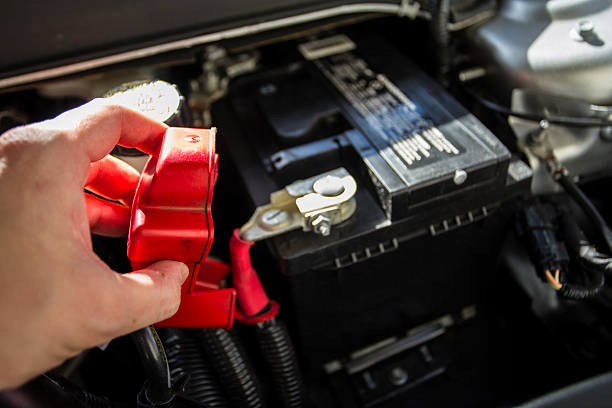Campervan Batteries: How to Choose the Best One

When it comes to traveling in a campervan, having a reliable battery is crucial. Not only does it power essential systems such as lights, appliances, and the refrigerator, but it can also be used to start the engine and charge electronic devices. Without a properly functioning battery, your trip could be cut short or even come to a complete stop.
Types of Campavan Baterries
First things is, what is a campervan? A campervan is a smaller version of a vehicle that allows accommodation while on the move – A home on wheels. There are several different types of campervan batteries on the market, each with their own unique set of pros and cons. Understanding the differences between them can help you make an informed decision when choosing the best battery for your needs.
Lead-Acid Batteries
Lead-acid batteries are the most common type of battery used in campervans. They are relatively inexpensive, widely available, and have a long lifespan if properly maintained. However, they are also relatively heavy and bulky, which can be an issue for those looking to save space in their campervan.
Lithium-ion batteries
Lithium-ion batteries are becoming increasingly popular in the campervan market. They are much lighter and more compact than lead-acid batteries, making them a great option for those looking to save space. Lithium batteries for campervans also have a longer lifespan and can be charged more quickly than lead-acid batteries. However, they are also more expensive and can be damaged if not properly maintained.
AGM (Absorbed Glass Mat)
Lead-acid batteries that are sealed and require no maintenance are known as AGM (Absorbed Glass Mat) batteries. In addition, they are lighter than conventional lead-acid batteries and have a longer lifespan. They can, however, be damaged if not properly maintained and are also more expensive.
Gel batteries
Gel batteries are a type of lead-acid battery that uses a gel-like substance instead of liquid electrolyte. They are sealed and maintenance-free, making them a great option for those who want a low-maintenance battery. They also have a longer lifespan than traditional lead-acid batteries. However, they are also more expensive and can be damaged if not properly maintained.
Factors to consider when choosing a campervan battery
Required power
There are a number of factors to take into account when selecting a campervan battery. Capacity and power requirements come first. You should pick a battery that can support your campervan’s power requirements and the amount of time you anticipate being without access to electricity.
Battery size and weight
Size and weight are two more things to take into account. You should pick a battery that is small and light if you want to maximize space in your campervan.
Durability of the battery
Longevity and durability are also crucial factors to take into account. You should pick a battery that can withstand road wear and tear and is long-lasting. You should also take the weather and temperature into account. Some batteries may not function as well in extremely cold or hot climates because they are better suited for those environments.
Cost of the battery
Finally, price should also be taken into account. The most expensive battery is frequently the best value in the long run, despite the fact that you might be tempted to go with the cheapest option.
Once you have chosen the right battery for your needs, it’s important to properly maintain and care for it. The first step is to store and charge the battery correctly. This means keeping the battery in a cool, dry place and charging it to the correct level before use.
Monitoring and testing the battery is also important. You should regularly check the battery’s voltage and charging level to ensure that it is functioning correctly.
Preventing damage and leaks is also important. This means making sure the battery terminals are clean and free from corrosion, and being careful not to overcharge or over-discharge the battery.
Tips for prolonging the life of your battery.
- Avoid deep discharging: Deep discharging a battery, which means discharging it to a very low level, can shorten its lifespan. Try to avoid discharging the battery too low and recharge it as soon as possible.
- Use a battery charger or maintainer: When your campervan isn’t in use, it’s a good idea to use a battery charger or maintainer to keep the battery charged. By doing so, the battery’s lifespan will be extended and excessively low discharge rates will be avoided.
- Keep the battery clean: Keeping the battery terminals and surrounding area clean and free from debris can help prevent corrosion and prolong the battery’s lifespan.
- Avoid extreme temperatures: Extreme temperatures can damage a battery and shorten its lifespan. Try to store the battery in a cool, dry place and avoid exposing it to high temperatures.
- Properly size the battery: Be sure to choose a battery that is the correct size for your campervan’s power requirements and usage patterns.
- Regularly check and test the battery: To make sure the battery is operating properly and to catch any problems early, regularly check the battery’s voltage and charging level.
- Use the appropriate battery type for your needs: When choosing a battery, think about your usage requirements and whether you’ll need a high-performance battery for regular use or a low-maintenance battery for sporadic use.
In conclusion,
A successful and enjoyable trip depends on selecting the right campervan battery. When choosing a battery, it’s important to take into account your unique needs and preferences as each battery type has a different set of advantages and disadvantages. Your battery will last for many trips to come if you maintain and care for it properly.
